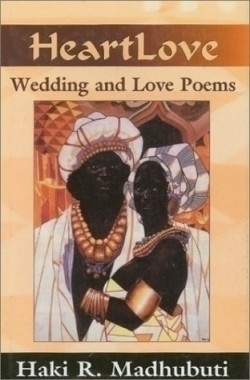
Heartlove
Wedding Love and Extended Family Poems
Written in the spirit of self-help books by African Americans for African Americans, Haki Madhubuti’s HeartLove takes black people on a journey within themselves. In a community that struggles to maintain family ties and keep its children alive, Madhubuti’s how-to-love manual advocates love as the key to empowerment and healing.
In “The Union of Two,” the first poem in the Wedding Poems section, Madhubuti reminds the lovers that “what matters is the renewing and long-running kinship/seeking common mission, willing work, memory,/melody, song.” Marriage is also about “affirming the Africa reach” he says in “Quiet Mountains to Your Elegance.?” One must “listen and love, do mindful work and love, speak good words and love, share meaningful values and love.” Working towards these things uplifts the black community as a whole.
In Quality of Love, the second section of HeartLove, Madhubuti pleads for the youth who “runs with the rough road tribe” and the woman in “She Never Grew Up” who knows only that she’s physically appealing. We also meet the man who is “Alone Much of the Time,” because the black woman who gleans culture from talk shows and soap operas is not for him. Yet, Madhubuti advocates that the community as a whole must care for these people. He also reminds us that there is hope in the “thinking, loving, giving, good and kind men among us.”
The poems in Extended Families, the final section of HeartLove, summarize Madhubuti’s message of healing, and hope through love. Understanding “heartlove” begins first with self, then family, then community and race. The section opens with poems dedicated to women who have “mothered” Madhubuti and include two in honor of Gwendolyn Brooks, whose poetry, Madhubuti says, is imbued with a
“blackworld exactness.” He speaks of the importance of friendship in the elegies
“Brad” and “Courage” for the late Betty Shabazz, and he highlights black Americans’ kinship with Africans across the Diaspora in the poems “Rwanda: Where Tears Have No Power” and “Haiti.” The closing poem, “Peace Starts Inside You,” underscores Madhubuti’s love teachings once more: “envy no one. Erase jealousy from your mind, heart &/words. speak & think good of self and others. awaken/ the life spirit inside of you.” In this inspiring how-to-love, how-to-heal, how-to-hope book, Madhubuti counters the pressures of external and internal forces that create conflicts in the nation’s black communities. That is the power of heartlove.
Reviewed by
Lisa Archibald
Disclosure: This article is not an endorsement, but a review. The publisher of this book provided free copies of the book to have their book reviewed by a professional reviewer. No fee was paid by the publisher for this review. Foreword Reviews only recommends books that we love. Foreword Magazine, Inc. is disclosing this in accordance with the Federal Trade Commission’s 16 CFR, Part 255.
